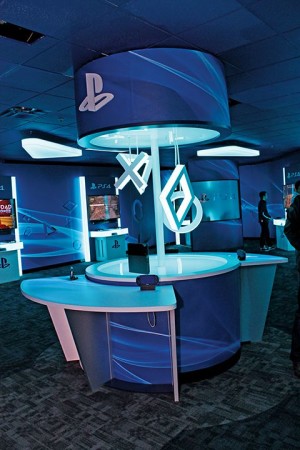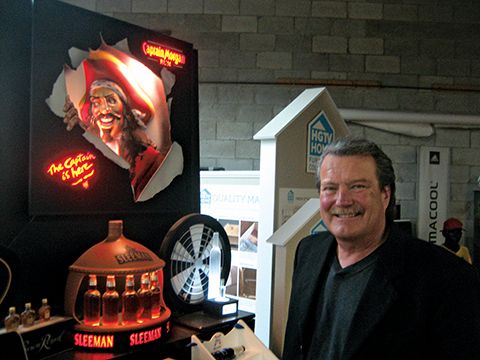By Peter Saunders
When Mike Douglas (pictured) started DNS Industries in Vaughan, Ont., on a shoestring in 2001, he was able to serve a previously established base of retail and food-service clients with custom-manufactured point-of-purchase (POP) displays, floor stands, counter displays and other components for their environments. In 2014, he was joined as president by a new CEO, Daniel Robert, in a restructuring aimed at expanding the company’s reach.
Personalizing production
Douglas has been in the business for more than
30 years. He began working for a display purchasing company, which got him interested in the manufacturing industry, so he next joined an acrylic fabricator. That led him to some of the clients he still does work for today.
“DNS came together quickly to support these customers’ requirements,” he says. “We started producing pieces right away and then found our niche as a full display manufacturer working with not just plastics, but also metal and wood.”
This niche centred on the capability to build hundreds of components when needed, while still being ‘small’ enough to focus on details.
“Some bigger manufacturing companies are more cumbersome, which can make it difficult to decipher what everyone wants,” says Douglas. “We can provide more personalized services for our clients. I still keep my hand involved in all project development.”
DNS was launched in a 372-m2 (4,000-sf) space and moved to its current 1,858-m2 (20,000-sf) space six years ago.
“That was a big step forward at the time,” says Douglas. “Rollouts of floor displays take up a lot of space.”
While the company’s projects require a multifaceted approach, including work by hand, digital technology has changed its display manufacturing processes significantly over the years.
“We bought our first router in our first year of business,” says Douglas. “I find myself wondering how we did anything before that! We used to have a sample maker and would put various pieces through different processes. Now we can simulate on a computer how a piece will fold, bend and interact with other elements before we created it through computer numerical control (CNC) routing, laser or waterjet cutting.”

The company’s milling and routing capabilities come in handy for many customized merchandizing displays. Photos courtesy DNS Industries
Recession recovery
The need for efficiency in manufacturing was emphasized during the global recession in 2008, when DNS managed to hold ground with many of its established clients, but found new opportunities were drying up.
“One of the problems was we didn’t have sales and marketing people internally,” says Douglas. “Other than my own sales, we were working through independent agents.”
Such was the backdrop for the addition of Robert as CEO, with an ownership stake. He has helped direct a new vision for DNS’ future.
“I began giving Mike some strategic advice at a time when DNS had shrunk from 25 to 30 employees to a bare-bones operation and was encountering production headaches,” he says. “I believed in the company because a high-quality, custom manufacturer should last forever. It was mainly a matter of networking and making new connections. The sky’s the limit!”
Robert is looking to export markets for growth, where he feels DNS’ specialized approach poses a strong alternative to low-cost manufacturing.
“We currently have a perfect scenario with the falling Canadian dollar, which makes us more competitive globally,” he says. “We can still serve the same core foundation of customers like Tim Hortons, but also seek growth opportunities with much more focus on marketing initiatives. And we’re figuring out how to increase our offerings to the existing clients, e.g. by integrating digital signs into displays.”






